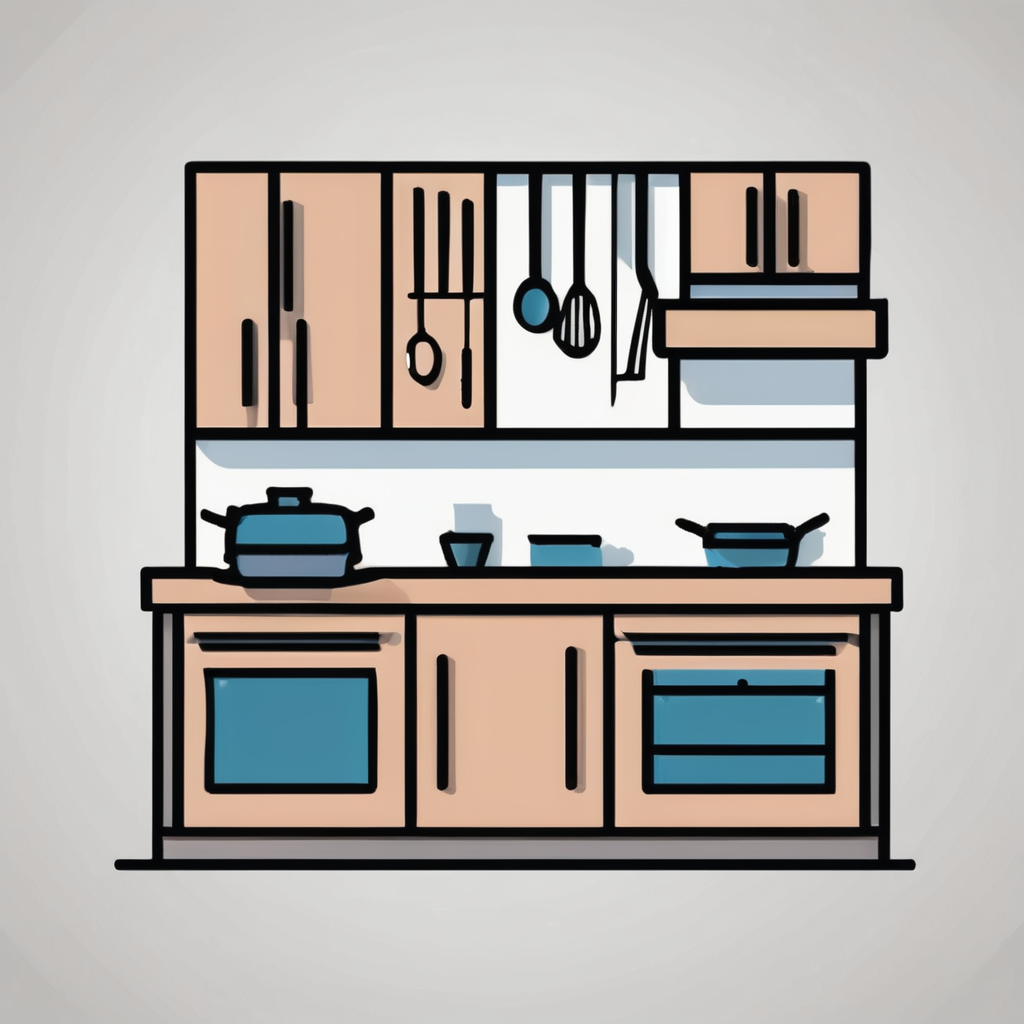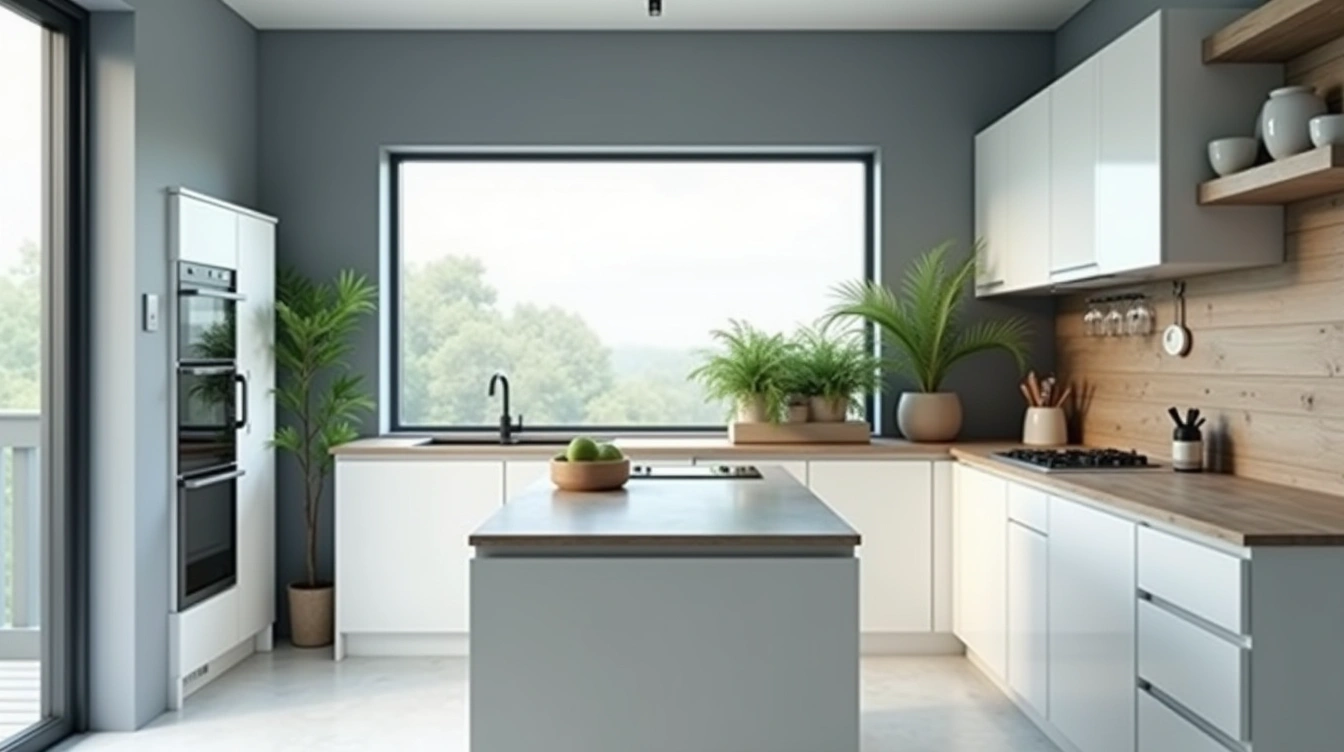Maximising Space in Compact UK Kitchens
When working within a compact kitchen design, making the most of every inch is essential. One of the best approaches is utilising vertical space. Installing open shelving and high cabinets that reach the ceiling provides ample room for storage and keeps essential items within easy reach while freeing up countertop areas.
Another crucial space-saving idea is selecting multipurpose furniture and integrated storage. For example, fold-away tables or pull-out countertops can expand your workspace without consuming permanent floor space. Integrated storage within kitchen islands or under seating not only hides clutter but also keeps frequently used items accessible.
Also to discover : Boost your kitchen’s efficiency: discover innovative space-saving solutions!
Streamlining the kitchen layout enhances both workflow and movement. Arranging appliances and work zones logically—from preparation to cooking to cleaning—reduces unnecessary steps, which is critical in small kitchens. Compact kitchen design benefits greatly from layouts such as U-shapes or galley kitchens, which maximize storage and surface areas while maintaining a smooth traffic flow.
By combining these small kitchen storage solutions and space-saving ideas, you can create a kitchen that feels open, organised, and highly functional despite limited square footage.
Also to see : Maximizing style: tips for crafting a sleek kitchen in compact uk spaces
Sustainable Materials and Finishes for Eco-Friendly Kitchen Design
Choosing sustainable kitchen materials is fundamental in creating a truly green kitchen design. One of the primary decisions involves selecting cabinet and countertop materials that minimize environmental impact. Recycled and reclaimed woods offer excellent options, as they prevent deforestation and reduce landfill waste. Additionally, woods certified by the Forest Stewardship Council (FSC) come from responsibly managed forests, ensuring sustainability without sacrificing aesthetic appeal or durability.
When it comes to finishes, eco-friendly finishes play a crucial role in maintaining indoor air quality and reducing harmful chemicals. Low-VOC (volatile organic compounds) paints and non-toxic finishes are preferred because they emit fewer pollutants compared to conventional alternatives. Natural stone alternatives, such as recycled glass countertops or sustainably sourced quartz, provide durable, long-lasting surfaces while avoiding the high extraction footprint of traditional stones.
Durability is another key consideration in sustainable kitchen design. Materials that stand the test of time minimize the need for frequent replacements and thus contribute to waste reduction. Incorporating surfaces that are resistant to scratches, moisture, and heat not only enhances the kitchen’s lifespan but also aligns with the principles of eco-friendly finishes and long-term sustainability. Embracing these choices ensures that the kitchen is as environmentally responsible as it is functional and stylish.
Integrating Energy-Efficient Appliances and Fixtures
Efficiency in kitchen design starts with selecting the right energy-efficient kitchen appliances. In the UK, prioritizing A-rated or higher appliances is crucial, as these models guarantee reduced energy consumption without compromising performance. Whether it’s a refrigerator, oven, or dishwasher, selecting appliances with high energy ratings is the foundation for lowering utility bills and minimizing environmental impact.
Induction hobs stand out among cooktops for their superior energy conversion rates compared to traditional electric or gas alternatives. They heat cookware directly, ensuring faster cooking times and decreased wasted heat. Additionally, incorporating water-saving fixtures such as low-flow taps can drastically reduce water consumption in kitchen tasks like washing and cleaning. These fixtures maintain strong water pressure while limiting overall flow, contributing to sustainable water use—a key concern with eco appliances UK.
LED lighting is another integral fixture, offering both longevity and lower power usage than incandescent or fluorescent bulbs. Pairing these appliances and fixtures with smart technology further enhances efficiency. Smart meters and appliance-specific monitors allow users to track and adjust consumption in real-time, optimizing energy use based on daily habits and moments of peak demand. Together, these innovations form a comprehensive approach to an energy-efficient kitchen tailored to UK standards.
Creating Functional and Sustainable Layouts
Crafting efficient and eco-friendly kitchen environments
Designing a sustainable kitchen layout starts with optimizing the workspace to promote ease and reduce waste. The classic kitchen work triangle—linking the sink, stove, and refrigerator—remains essential, even in compact kitchen workflows. Position these three zones thoughtfully to minimize unnecessary movement and energy consumption, tailoring the layout to the specific dimensions of the space.
Incorporating recycling and composting solutions is critical for sustainability. Place bins in convenient, accessible locations within the layout to encourage consistent use without disrupting the kitchen flow. Integrate them near food preparation areas or sinks to streamline waste disposal and support eco-friendly habits.
Maximizing natural light enhances both functionality and energy efficiency. Use reflective surfaces like glossy backsplashes and light-colored cabinetry to bounce sunlight throughout the room. Strategic window dressing choices—such as sheer curtains or blinds that allow ample daylight—further improve illumination while maintaining privacy.
By combining these elements, you create a kitchen that not only supports a compact kitchen workflow but also champions sustainable and functional design.
Eco-Conscious Kitchen Habits and Organisation
Adopting eco-friendly kitchen habits is essential for reducing your environmental footprint and promoting sustainability. One of the most effective sustainable kitchen tips is to prioritize reusable containers over single-use plastics. Utilizing glass jars or stainless steel containers for bulk storage minimizes packaging waste and ensures longer-lasting storage solutions. Additionally, embracing package-free shopping when possible dramatically cuts down on unnecessary plastic wrapping, contributing to substantial waste reduction in your kitchen.
Composting organic waste is another cornerstone of waste reduction kitchen practices. By separating food scraps and transforming them into nutrient-rich compost, you can reduce the amount of garbage sent to landfills and improve your garden’s soil health if you maintain one. Organizing your kitchen to facilitate easy recycling also makes a significant difference. Keeping clearly labeled bins and regularly sorting recyclables helps prevent contamination and ensures more material is correctly processed.
Maintaining a minimalist approach in your kitchen promotes sustainability by reducing clutter and discouraging the accumulation of unused items. A streamlined space encourages mindful purchasing decisions, prevents food spoilage, and simplifies maintenance. Together, these eco-friendly kitchen habits contribute to a more sustainable lifestyle—benefitting both the environment and your daily routine.
Product Recommendations and Design Inspiration
When creating an eco-friendly kitchen, choosing suppliers that prioritize sustainability is essential. UK sustainable brands offer a wide range of green kitchen ideas and products designed to minimize environmental impact. These include appliances with high energy efficiency ratings, recycled and biodegradable materials, and packaging that reduces waste. Selecting from these sources ensures your kitchen not only looks modern but also aligns with eco-conscious values.
For example, kitchens designed using green products often feature countertops made from recycled glass or sustainably sourced wood, paired with energy-efficient LED lighting. Before-and-after transformations vividly demonstrate how incorporating these eco-friendly kitchen products can transform spaces into inviting, functional, and environmentally responsible areas. Such examples emphasize the blend of aesthetics and sustainability.
To support your journey, numerous guides and visual inspiration collections are available that focus on UK sustainable brands and eco-friendly design solutions. Exploring these resources can provide valuable insights and creative ideas when planning your kitchen remodel. Embracing these elements not only benefits the planet but also enhances the longevity and appeal of your kitchen space.





